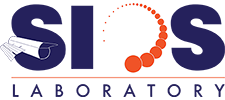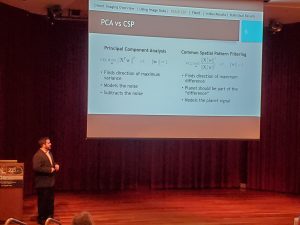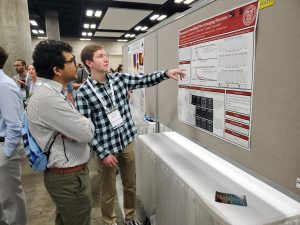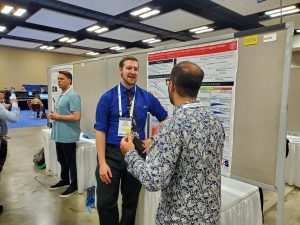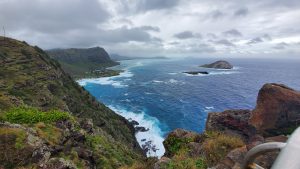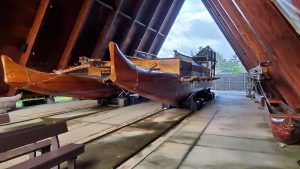As a going away present, I would like to bequeath my magnum opus.
Congratulations Dr. Soto!
Congratulations to Gabriel Soto for successfully completing his B exam. A copy of his talk, titled “Orbital Design Tools and Scheduling Techniques for Optimizing Space Science and Exoplanet-Finding Missions”, is available here, or watch his presentation below.
Astronomical Journal Paper Published
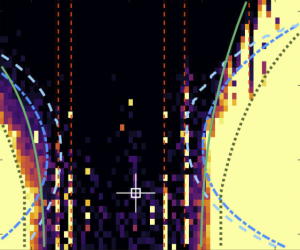 Congratulations to Carlos Gascón (visiting student from Polytechnic University of Catalonia in 2019) on the publication of his paper: “Analytic Stability Maps of Unknown Exoplanet Companions for Imaging Prioritization” in the Astronomical Journal. This paper explores the idea of looking for unknown planets that could be directly imaged, orbiting stars where one (un-imageable) planet has already been discovered. Data for the paper is also available from Cornell eCommons.
Congratulations to Carlos Gascón (visiting student from Polytechnic University of Catalonia in 2019) on the publication of his paper: “Analytic Stability Maps of Unknown Exoplanet Companions for Imaging Prioritization” in the Astronomical Journal. This paper explores the idea of looking for unknown planets that could be directly imaged, orbiting stars where one (un-imageable) planet has already been discovered. Data for the paper is also available from Cornell eCommons.
EXOSIMS – WFIRST Publication by Dean Keithly now in JATIS
Dean Keithly and the hard working maintainers of EXOSIMS finally have a new publication validating the number of exoplanets detectable via direct imaging by the WFIRST coronagraph. The paper includes planet population, observation time optimization, and scheduling of these observations.
The full citation is:
Dean R. Keithly, Dmitry Savransky, Daniel Garrett, Christian Delacroix, Gabriel Soto, “Optimal scheduling of exoplanet direct imaging single-visit observations of a blind search surveylt;/p,” J. Astron. Telesc. Instrum. Syst. 6(2), 027001 (2020), doi: 10.1117/1.JATIS.6.2.027001.
The paper is available under open access at http://dx.doi.org/10.1117/1.JATIS.6.2.027001.
AAS 235th Meeting
SIOSLab was well represented last month at the 235th AAS Meeting in Honolulu, Hawai’i. Corey Spohn presented his poster on “Dynamically Scheduling Direct Imaging Missions” and Dean Keithly Presented his talk on “Exoplanet classification probabilities from initial detections in a direct imaging mission.” Two members also presented dissertation talks: Jacob Shapiro presented his talk on “Identifying Exoplanets with CSP Filtering and a Forward Model Matched Filter” and Gabriel Soto presented his talk on “Fuel Cost Heuristics for Starshade Retargeting Slew Maneuvers.”
GPI 2.0 Is a Go!
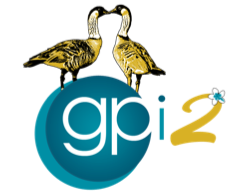 We are very happy to announce that we have secured funding from the NSF and HSF for an upgrade of the Gemini Planet Imager. Once commissioned at Gemini North in Hawaii in 2022, GPI 2.0 will be even more sensitive than the original GPI, and capable of imaging planets around even more distant and fainter stars. For more information, see our Research page, as well as this article in the Cornell Chronicle.
We are very happy to announce that we have secured funding from the NSF and HSF for an upgrade of the Gemini Planet Imager. Once commissioned at Gemini North in Hawaii in 2022, GPI 2.0 will be even more sensitive than the original GPI, and capable of imaging planets around even more distant and fainter stars. For more information, see our Research page, as well as this article in the Cornell Chronicle.
Photon Sources Diagram
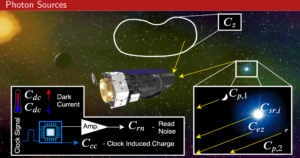
This is a diagram from Dean Keithly’s admission to candidacy exam slide deck outlining the major light sources included in EXOSIMS and our model of WFIRST.
SPIE Optics + Photonics 2019
The SPIE Optics + Photonics conference took place August 11 – 16 in San Diego. The SIOSLab attended, and presented two talks: Optical design of a modular segmented space telescope and Exploration of the dynamical phase space of stars with known planets.
Congratulations to Dean Keithly on Passing his A Exam
Dean Keithly successfully passed his A exam on 9/9/2019, marking his entrance into the dissertation phase of his degree program. His presentation can be viewed here.
2019 AAS/AIAA Astrodynamics Specialist Conference
The 2019 AAS/AIAA Astrodynamics Specialist Conference took place between August 11th-16th in Portland, Maine this year. I presented my talk titled “Solar Sail Trajectories and Orbit Phasing of Modular Spacecraft for Segmented Telescope Assembly about Sun-Earth L2.”
